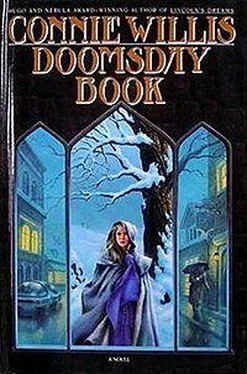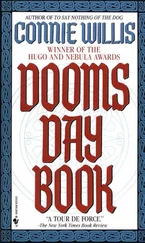The snow made it slow going, and he was already out-of- breath, the tightness in his chest like an iron band.
"What do we do when we get there?" Colin asked, striding effortlessly through the snow.
" You stay out of sight and wait for me," Dunworthy said. "Is that perfectly clear?"
"Yes," Colin said. "Are you certain this is the right road?"
He was not certain at all. It had been curving west, away from the direction Dunworthy thought the village lay in, and just ahead it bent north again. He peered anxiously through the trees, trying to catch a glimpse of stone or thatch.
"The village wasn't this far, I'm sure of it," Colin said, rubbing his arms. "We've been walking for hours."
It had not been hours, but it had been at least an hour, and they had not come to so much as a cottar's hut, let alone a village. There were a score of villages here, but where?
Colin took out his locator. "See," he said, showing Dunworthy the readout. "We've come too far south. I think we should go back to the other road."
Dunworthy looked at the readout and then at the map. They were nearly straight south of the drop and over three kilometers from it. They would have to retrace their steps nearly all the way, with no hope of finding Kivrin in that time, and at the end of it, he was not certain he would be able to go any farther. He already felt done in, the band tightening round his chest with every step, and he had a sharp pain midway up his ribs. He turned and looked at the curve ahead, trying to think what to do.
"My feet are freezing," Colin said. He stamped his feet in the snow, and a bird flew up, startled, and flapped away. Dunworthy looked up, frowning. The sky was becoming overcast.
"We should have followed the hedge," Colin said. "It would have been much — "
"Hush," Dunworthy said.
"What is it?" Colin whispered. "Is someone coming?"
"Shh," Dunworthy whispered. He backed Colin to the edge of the road and listened again. He'd thought he'd heard a horse, but now he couldn't hear anything. It might only have been the bird.
He motioned Colin behind a tree. "Stay here," he whispered and crept forward till he could see around the curve.
The black stallion was tied to a thorn bush. Dunworthy backed hastily behind a spruce tree and stood still, trying to see the rider. There was no one in the road. He waited, trying to quiet his own breathing so he could hear, but no one came, and he could hear nothing but the stallion's pacing.
It was saddled, and its bridle was chased with silver, but it looked thin, its ribs standing out sharply against the girth. The girth itself was loose, and the saddle slipped a little to the side as it stepped backward. The stallion tossed his head, pulling hard against the reins. He was obviously trying to free himself, and as Dunworthy moved closer he could see he was not tied but tangled in the brambles.
He stepped into the road. The stallion turned his head toward him and began to whinny wildly.
"There, there, it's all right," he said, coming up carefully on its left side. He put his hand on its neck, and it stopped whinnying and began nosing at Dunworthy, looking for food.
He looked for some grass sticking up through the snow to feed her, but the area around the thornbush was nearly bare of snow.
"How long have you been trapped here, old boy?" he asked. Had the stallion's owner been stricken with the plague as he rode, or had he died, and the panicked horse bolted, running until his flying reins got tangled in the bush?
He walked a little way into the woods, looking for footprints, but there weren't any. The stallion began to whinny again, and he went back to free him, snatching up stalks of grass that stuck up through the snow as he went.
"A horse! Apocalyptic!" Colin said, racing up. "Where did you find it?"
"I told you to stay where you were."
"I know, but I heard the horse whinnying, and I thought you'd run into trouble."
"All the more reason for you to have obeyed me." He handed the grass to Colin. "Feed him these."
He bent over the bush and pulled out the reins. The stallion, in his efforts to extricate himself, had twisted the rein hopelessly round the spiked brambles. Dunworthy had to hold the branches back with one hand and reach in with the other to unwind it. He was covered with scratches within seconds.
"Whose horse is it?" Colin asked, offering the horse a piece of grass from a distance of several feet. The starving animal lunged at it and Colin jumped back, dropping it. "Are you sure it's tame?"
Dunworthy had incurred a near-fatal injury when the stallion jerked his head down for the grass, but he had the rein free. He wrapped it around his bleeding hand and took up the other one.
"Yes," he said.
"Whose horse is it?" Colin said, stroking its nose timidly.
"Ours." He tightened the girth and helped Colin, protesting, up behind the saddle, and mounted.
The stallion, not yet realizing he was free, turned his head accusingly when he kicked her gently in the sides but then cantered off back down the snow-packed road, delighted at his freedom.
Colin clutched frantically at Dunworthy's middle, just at the spot where the pain was, but by the time they had gone a hundred meters, he was sitting up straight and asking "How do you steer it?" and "What if you want it to go faster?"
It took them no time at all to return to the main road. Colin wanted to go back to the hedge and strike out across- country, but Dunworthy turned the stallion the other way. The road forked in half a mile, and he took the lefthand road.
It was a good deal more travelled than the first one, though the woods it led through were even thicker. The sky was completely overcast now, and the wind was picking up.
"I see it!" Colin said, and let go with one hand to point past a stand of ash trees to a glimpse of dark gray stone roof against the gray sky. A church, perhaps, or a manor house. It lay off to the east, and almost immediately a narrow track branched from the road, over a rickety wooden plank bridging a stream, and across a narrow meadow.
The stallion did not prick up its ears or attempt to speed his pace, and Dunworthy concluded it must not be from the village. And a good thing, too, or we'd be hanged for horse- stealing before we could ask where Kivrin is, he thought, and saw the sheep.
They lay on their sides, mounds of dirty gray wool, though some of them had huddled near the trees, trying to keep out of the wind and the snow.
Colin hadn't seen. "What do we do when we get there?" he asked Dunworthy's back. "Do we sneak in or just ride up and ask somebody if they've seen her?"
There will be no one to ask, Dunworthy thought. He kicked the stallion into a canter and they rode through the ash trees and into the village.
It was not at all like the illustrations in Colin's book, buildings around a central clearing. They were scattered in among the trees, almost out of sight of one another. He glimpsed thatched roofs, and farther off, in a grove of ash trees, the church, but here, in a clearing as small as that of the drop, was only a timbered house and a low shed.
It was too small to be a manor house — the steward's perhaps, or the reeve's. The wooden door of the shed stood open, and snow had drifted in. There was no smoke from the roof, and no sound.
"Perhaps they've fled," Colin said. "Lots of people fled when they heard the plague was coming. That's how it spread."
Perhaps they had fled. The snow in front of the house was packed flat and hard, as if many people and horses had been in the yard.
"Stay here with the horse," he said, and went up to the house. The door here was not shut either, though it had been pulled nearly to. He ducked in the little door.
It was icy inside and so dark after the bright snow that he could see nothing except the red after-image. He pushed the door open all the way, but there was still scarcely any light, and everything seemed tinged with red.
Читать дальше












